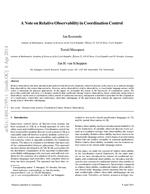Techreport4013: Unterschied zwischen den Versionen
Aus International Center for Computational Logic
Tomas Masopust (Diskussion | Beiträge) Keine Bearbeitungszusammenfassung |
Markus Krötzsch (Diskussion | Beiträge) K (Textersetzung - „|Forschungsgruppe=Knowledge Systems“ durch „|Forschungsgruppe=Wissensbasierte Systeme“) |
||
| Zeile 15: | Zeile 15: | ||
|Abstract=Relative observability has been introduced and studied in the framework of partially observed discrete-event systems as a condition stronger than observability, but weaker than normality. However, unlike observability, relative observability is closed under language unions, which makes it interesting for practical applications. In this paper, we investigate this notion in the framework of coordination control. We prove that conditional normality is a stronger condition than conditional (strong) relative observability, hence conditional strong relative observability can be used in coordination control instead of conditional normality, and present a distributive procedure for the computation of a conditionally controllable and conditionally observable sublanguage of the specification that contains the supremal conditionally strong relative observable sublanguage. | |Abstract=Relative observability has been introduced and studied in the framework of partially observed discrete-event systems as a condition stronger than observability, but weaker than normality. However, unlike observability, relative observability is closed under language unions, which makes it interesting for practical applications. In this paper, we investigate this notion in the framework of coordination control. We prove that conditional normality is a stronger condition than conditional (strong) relative observability, hence conditional strong relative observability can be used in coordination control instead of conditional normality, and present a distributive procedure for the computation of a conditionally controllable and conditionally observable sublanguage of the specification that contains the supremal conditionally strong relative observable sublanguage. | ||
|Download=A Note on Relative Observability in Coordination Control.pdf | |Download=A Note on Relative Observability in Coordination Control.pdf | ||
|Forschungsgruppe= | |Forschungsgruppe=Wissensbasierte Systeme | ||
|DOI=http://arxiv.org/abs/1404.2195 | |DOI=http://arxiv.org/abs/1404.2195 | ||
}} | }} | ||
Aktuelle Version vom 24. Mai 2016, 18:01 Uhr
A Note on Relative Observability in Coordination Control
Jan KomendaJan Komenda, Tomáš MasopustTomáš Masopust, Jan H. van SchuppenJan H. van Schuppen
Jan Komenda, Tomáš Masopust, Jan H. van Schuppen
A Note on Relative Observability in Coordination Control
Technical Report, arXiv.org, volume CoRR abs/1404.2195, April 2014
A Note on Relative Observability in Coordination Control
Technical Report, arXiv.org, volume CoRR abs/1404.2195, April 2014
- KurzfassungAbstract
Relative observability has been introduced and studied in the framework of partially observed discrete-event systems as a condition stronger than observability, but weaker than normality. However, unlike observability, relative observability is closed under language unions, which makes it interesting for practical applications. In this paper, we investigate this notion in the framework of coordination control. We prove that conditional normality is a stronger condition than conditional (strong) relative observability, hence conditional strong relative observability can be used in coordination control instead of conditional normality, and present a distributive procedure for the computation of a conditionally controllable and conditionally observable sublanguage of the specification that contains the supremal conditionally strong relative observable sublanguage. - Forschungsgruppe:Research Group: Wissensbasierte SystemeKnowledge-Based Systems
@techreport{KMS2014,
author = {Jan Komenda and Tom{\'{a}}{\v{s}} Masopust and Jan H. van
Schuppen},
title = {A Note on Relative Observability in Coordination Control},
institution = {arXiv.org},
year = {2014},
month = {April}
}
